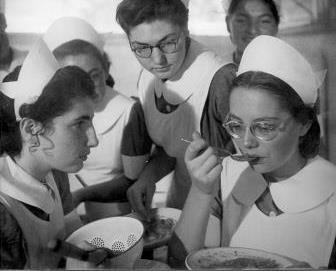Recently, we finished cataloguing one of the most vast and unique photo collections in the CZA – the WIZO photo collection that documents the many arenas in which the organization was active.
The WIZO organization was founded in 1920, and was one of the many manifestations of a social revolution that took place in Europe at the time- the struggle for political suffrage for women, phenomena that is considered, today, as the first wave of feminism. This process, which began in the 19th century, was part of a wider process of the "democratization of politics", with Europe's gradual progression towards more democratic governing trends and the politicization of civil society. In 1848, the first feminist congress took place in the United States, and a year later, the US was the first country to deal with women's rights on the legislative level, with the enactment of the law warranting women equal rights in inheritance and ownership of property. In Europe, a similar process took place, and became a growing nuisance for the male establishment. In Britain it was Emmeline Pankhurst, founder of the British Suffragette movement, who led this struggle, which gained success in 1918, with the accordance of equal voting rights to British female citizens.
Feminism and Zionism
These notions of equality had a strong influence on Zionist women In Britain. Already before World War I, women Zionist organizations were established, stemming either from disappointment of the paternalistic Zionist establishment, or from a desire to fine- tune the struggle for gender equality within the Zionist movement. The most known one is of course Hadassah. "Bnot Zion" was a British women's organization founded at the time and headed by Rebecca Sieff, who would become WIZO's first president.
In 1918, the Zionist commission came to Palestine to assess the living conditions of the Jewish Yishuv. Among its members were Haim Weitzman, husband of Vera Weitzman, Israel Sieff, husband of Rebecca Sieff, and David Eder, who came with his wife Edith Eder. When they returned to Britain, Vera Weitzman and Rebecca Sieff took their own trip to the area, and joined Edith Eder, that remained in Palestine in order to collect firsthand testimonies from Jewish settlers. The three women were shocked by the situation in the country. Vera Weitzman writes about the experience: "They (the pioneers) misinterpreted the concept of 'equality' between men and women. To our minds, these enthusiastic, idealistic women were mortgaging their future motherhood and even risking their health for this 'equality' principle. Their homes, bare and simple, were neglected: cooking was haphazard at best…They and their menfolk snatched whatever food they could lay hands on". Weitzman, Sieff and Eder believed that the harsh living conditions warranted a different approach towards the inclusion of women in the Zionist project. This conviction led them to found WIZO.

Got milk?
The WIZO organization, which convened for the first time in London in 1920, with Rebecca Sieff as its president, was defined as a non - partisan organization, committed for women's rights among the Zionist movement. On the operative level, the organization took upon itself the training of women in various fields – agriculture, education, home economy, and childcare. In the organization's early days, it acted without an official local branch in Palestine. In 1927, the WIZO the local WIZO federation was established wand worked directly under the guidance of the London office.
Until the establishment of the state of Israel, WIZO, sometimes in cooperation with Hadassah, was responsible for developing the social infrastructure for the Yishuv. WIZO and Hadassah founded "Tipat Halav" ("A Drop of Milk") – clinics that gave young mothers guidance in childcare, and distributed milk to mothers who couldn't feed their newborns in the harsh living conditions endured by many families. WIZO also founded public nurseries for babies who were abandoned by financially struggling families. The organization founded soup kitchens and clothing stores that sold clothes for very low prices. Agricultural schools were founded for girls, such as the school in Nahalal and Eynot. WIZO was took an active part in the inclusion of women in the labor force, and one of its unique projects was supporting small industries and workshops, such as the Yemenite embroidery workshop that was opened in Jerusalem in 1925. The organization's members worked in immigrant camps to improve sanitary conditions, guiding women in home economy, and more. This vast activity is documented in this photo collection which is comprised of hundreds of photos, some of them displayed for the public for the first time.